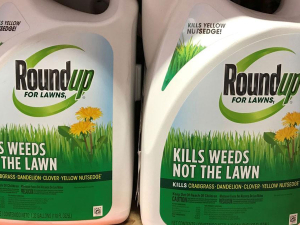Greenpeace fearmongering on glyphosate - Feds
Federated Farmers says climate protest group Greenpeace is manufacturing outrage and attempting to scare New Zealanders with headlines that have no basis in science.
 Glyphosate is the active ingredient in weedkillers such as Round Up, widely used by growers and orchardists.
Glyphosate is the active ingredient in weedkillers such as Round Up, widely used by growers and orchardists.
A charitable trust, which unsuccessfully pushed for a review of glyphosate use in the country, says it is disappointed by the decision of the Environmental Protection Authority (EPA).
Environmental Law Initiative, which uses litigation, advocacy and education to protect NZ’s environment and biodiversity, says it provided a large amount of information to the EPA on the effects of glyphosate, including evidence that glyphosate has significant impacts on human and environmental health. Glyphosate is the active ingredient in weedkillers such as Round Up, widely used by growers and orchardists.
Dr Matt Hall, director, research and legal at ELI told Rural News that the EPA has acknowledged that this information was new to them but has found that the information was not significant.
“We struggle to understand how information which shows glyphosate has impacts on the human nervous system, endocrine system and acts as a possible human carcinogen is not deemed to be significant.
“We will closely scrutinise the decision and will assess whether there are grounds for an appeal.”
The ELI applied to the EPA in February 2024 to decide whether there are grounds to reassess glyphosate and glyphosate-containing substances, citing significant new information about the negative effects of the substance.
“After reviewing information provided by ELI and recent international research on the substance, a decision-making committee of the EPA has decided there are no grounds for a reassessment,” the EPA says.
"What we received from the applicant does not meet the criteria for significant new information and does not justify a reassessment of this substance - particularly when considered alongside the findings of other international regulators," says Dr Chris Hill, EPA general manager hazardous substances and new organisms.
Regulators from jurisdictions including the European Union, Australia, and the US extensively reviewed glyphosate. They concluded it should not be classified as a carcinogen and that any potential risks from using the substance have not changed.
"We carefully weighed the information provided by the applicant alongside a large amount of other evidence and consider that products containing the substance are safe to use if the existing rules are followed," says Hill.
"We will review any new research on glyphosate that shows a change in the risks and is relevant to the New Zealand context."
Fonterra’s impending exit from the Australian dairy industry is a major event but the story doesn’t change too much for farmers.
Expect greater collaboration between Massey University’s school of Agriculture and Environment and Ireland’s leading agriculture university, the University College of Dublin (UCD), in the future.
A partnership between Torere Macadamias Ltd and the Riddet Institute aims to unlock value from macadamia nuts while growing the next generation of Māori agribusiness researchers.
A new partnership between Dairy Women’s Network (DWN) and NZAgbiz aims to make evidence-based calf rearing practices accessible to all farm teams.
Despite some trying circumstances recently, the cherry season looks set to emerge on top of things.
Changed logos on shirts otherwise it will be business as usual when Fonterra’s consumer and related businesses are expected to change hands next month.

OPINION: Here w go: the election date is set for November 7 and the politicians are out of the gate…
OPINION: ECan data was released a few days ago showing Canterbury farmers have made “giant strides on environmental performance”.